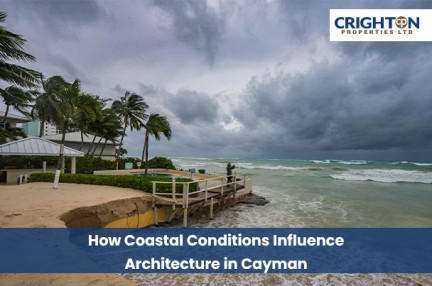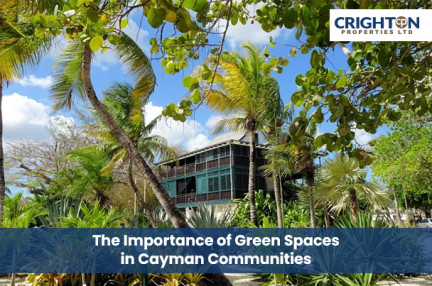
How Coastal Conditions Influence Architecture in Cayman
Discover how coastal conditions in the Cayman Islands shape architectural design, from hurricane resistance to ventilation and elevated foundations.
Crighton Properties | June 20, 2024
Understanding the value of a property is crucial when buying or selling. Knowing what factors affect its value helps you decide the right price to sell it for or what you should pay. This knowledge empowers you to make smart decisions.
In simple terms, a property's value is typically determined by what a buyer is willing to pay and what a seller is willing to accept. However, the market also plays a big role.
Let's discuss the 12 key factors that influence a property's value.
The country's economy affects how much people spend and earn. Key signs of how well a country's doing economically include how much money people have to spend (disposable income), how many people don't have jobs (unemployment rate), how poor people are (poverty index), how well people live (standard of living), and how much the country's economy is growing (GDP growth rate). All these things impact the real estate market.
When the economy functions well, individuals are generally happier and have more disposable income. Thus, there's a greater chance that they'll wish to purchase properties for sale in the Cayman Islands, which ultimately drives up real estate prices.
Other factors, like interest rates and government policies, significantly influence market conditions and property values. In contrast, when supply outpaces demand in a buyer's market, property values may fall or stay the same. Also, market trends impact real estate investment strategies.
To make wise judgments, one must monitor market trends and consult a Cayman real estate company.
The stability of a country's government affects many other things, like how easy it is to do business, how confident people feel about the economy, how easy it is to make choices, and how easy it is to invest money. Usually, when a country's government is stable, its economy performs better. This means people keep spending money, the economy keeps getting stronger, and the property value will continue to increase.
How many properties of a certain type and size are available and how many people want them directly affects their current value. If a lot of people want a property, its price goes up. But if real estate is available more, then its value goes down.
The location of a property significantly influences its valuation. Factors such as neighborhood quality, proximity to amenities such as schools and restaurants, and the overall commercial viability of the area all contribute to its market worth.
The importance of location cannot be overstated in real estate transactions. A Cayman Islands real estate property possesses desirable features that strongly impact their decision-making process. Properties located within safe neighborhoods and near essential services, transportation hubs, educational institutions, and employment opportunities generally experience enhanced market demand and subsequently appreciate in value.
Prospective buyers must recognize that while various aspects of a property can be altered or improved, its location remains immutable. Thus, the prudent selection of a well-positioned property is paramount to realizing long-term investment gains.
This is a common word used to indicate similar features of properties. It helps you compare features like size, number of bedrooms & bathrooms, building age, location, and so on.
A property's value may be impacted by the caliber of the town and neighborhood it is located in. Elements including neighborhood appeal, the caliber of the nearby schools, the accessibility of public services, and the availability of recreational activities can also impact value. Higher property values are frequently associated with communities with vibrant homeowner organizations.
Some things added or changed in a property can make it worth more. For example, new kitchen appliances, energy-saving devices, nicer bathrooms, wood floors, extra rooms, and a swimming pool or deck can raise the value.
But old stuff, missing important things, or big repairs needed can make a property worth less. When you're figuring out how much a property is worth, you have to think about what shape it's in and what could make it better.
How old is the property? Does it need a lot of fixing up? If it's fairly new and doesn't need many repairs, it's probably worth more. But besides age, the condition matters, too. People prefer buying a well-kept older place over a brand-new one that needs a lot of work.
Interest rates in a country can affect real estate values. They also influence how much people spend and how confident investors are in the area. When interest rates are low, mortgage payments are lower, too, making it more affordable to buy. This makes investing in property more attractive than keeping money in the bank for lower returns.
Buyers like properties they can customize and update to their liking. If a property has extra space and room to upgrade bathrooms and design, it's likely worth more.
A garage can be useful and make your property worth more over time. But buyers often wonder exactly how much value it adds. A garage is a good place to keep your cars safe and in good shape. Plus, you can store other stuff like bikes, golf clubs, or tools there, too. We always consider the garage when considering how much a property is worth. Is it big enough for one or two cars? Is it in good shape? Is it connected to the house or separate? How easy is it to get to? And how old is it? A garage is a crucial factor in property valuation.
When you're checking out a house, you first notice how it looks from the outside. That initial impression is super important, especially for buyers. If a property for sale in the Cayman Islands doesn't look nice from the curb, it usually means it's not worth as much. But if it has great curb appeal, a well-kept yard, a welcoming front entrance, a nice walkway, and other features that make it look inviting, it will be worth more.
Understanding what makes a property valuable is important for buyers and sellers. Economic stability, politics, and the number of available real estate properties matter. Where the home or lot is located matters a lot, like if it's close to schools or in a nice neighborhood. The property's condition and features also make a big difference. Things like interest rates and whether it has a garage affect the value, too. How it looks from the outside, known as curb appeal, is also important.
Considering all these things helps people make smart choices when buying or selling Cayman real estate. This is why you should work with professional real estate agents with experience in property valuation and appraisal in the local area.
There are several ways to determine your property's value, such as consulting with real estate agents, using online tools, or hiring a professional to assess its value based on its condition, location, and market conditions.
Fixing up your property, like redoing the kitchen or adding more space, can often make it worth more. However, how much more it's worth depends on factors such as how good the fixes are and the property's location.
Things nearby, like schools, parks, and stores, and how easy it is to get around, can affect the value of your property. Usually, a property is worth more if it offers more convenience and improves life for people there.
Yes, it does. If the neighborhood is safe, looks nice, and people take care of it, your property is usually worth more. But if it's unsafe or looks bad, your property might not be worth as much.

Discover how coastal conditions in the Cayman Islands shape architectural design, from hurricane resistance to ventilation and elevated foundations.

Discover why green spaces are essential in Cayman communities, enhancing property values, well-being, and sustainable urban development.

Discover smart renovation ideas that increase your Cayman property value, attract buyers, and maximize ROI in today’s competitive real estate market.